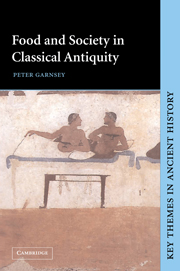Book contents
- Frontmatter
- Contents
- List of illustrations
- Acknowledgements
- Abbreviations
- Preface
- Introduction: Food, substance and symbol
- 1 Diet
- 2 Food and the economy
- 3 Food crisis
- 4 Malnutrition
- 5 Otherness
- 6 Forbidden foods
- 7 Food and the family
- 8 Haves and havenots
- 9 You are with whom you eat
- Conclusion: Choice and necessity
- Bibliographical essay
- Bibliography
- Index
Preface
Published online by Cambridge University Press: 05 June 2012
- Frontmatter
- Contents
- List of illustrations
- Acknowledgements
- Abbreviations
- Preface
- Introduction: Food, substance and symbol
- 1 Diet
- 2 Food and the economy
- 3 Food crisis
- 4 Malnutrition
- 5 Otherness
- 6 Forbidden foods
- 7 Food and the family
- 8 Haves and havenots
- 9 You are with whom you eat
- Conclusion: Choice and necessity
- Bibliographical essay
- Bibliography
- Index
Summary
Greeks and Romans, rich or poor, were obsessed with food. For most people, life was a perpetual struggle for survival. Among the well-off minority, there developed an elaborate haute cuisine, and, in reaction, a rhetoric (and in certain contexts, a practice) of rejection or continence, in the service of politics, morality, philosophy, religion or health.
This book presents food as a biocultural phenomenon. Food is at once nutrition, needed by the body for its survival, and cultural object, with various non-food uses and associations. Food functions as a sign or means of communication. It governs human relationships at all levels. Food serves to bind together people linked by blood, religion or citizenship; conversely, it is divisive, being distributed and consumed in accordance with existing hierarchies.
Historians and archaeologists have long been interested in the material aspects of food in classical antiquity. They have traced the origins, diffusion and evolution of particular foodstuffs and catalogued and discussed what was eaten, from where it came, how it was produced and distributed, how it was processed and cooked. Their findings form part of the background of my research, and to some extent I have followed in their footsteps. Some of the early chapters of this book reflect my previous work on systems of production and distribution, and patterns of consumption during times of both relative normality and stress. But I go on here to pose the question of food-availability.
- Type
- Chapter
- Information
- Food and Society in Classical Antiquity , pp. xi - xivPublisher: Cambridge University PressPrint publication year: 1999

